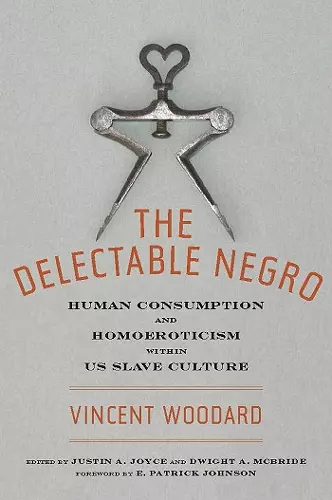The Delectable Negro
Human Consumption and Homoeroticism within US Slave Culture
Vincent Woodard author Justin A Joyce editor Dwight McBride editor
Format:Paperback
Publisher:New York University Press
Published:27th Jun '14
Should be back in stock very soon
This paperback is available in another edition too:
- Hardback£68.00(9780814794616)

Winner of the 2015 LGBT Studies Award presented by the Lambda Literary Foundation
Unearths connections between homoeroticism, cannibalism, and cultures of consumption in the context of American literature and US slave culture that has largely been ignored until now
Scholars of US and transatlantic slavery have largely ignored or dismissed accusations that Black Americans were cannibalized. Vincent Woodard takes the enslaved person’s claims of human consumption seriously, focusing on both the literal starvation of the slave and the tropes of cannibalism on the part of the slaveholder, and further draws attention to the ways in which Blacks experienced their consumption as a fundamentally homoerotic occurrence. The Delectable Negro explores these connections between homoeroticism, cannibalism, and cultures of consumption in the context of American literature and US slave culture.
Utilizing many staples of African American literature and culture, such as the slave narratives of Olaudah Equiano, Harriet Jacobs, and Frederick Douglass, as well as other less circulated materials like James L. Smith’s slave narrative, runaway slave advertisements, and numerous articles from Black newspapers published in the nineteenth century, Woodard traces the racial assumptions, political aspirations, gender codes, and philosophical frameworks that dictated both European and white American arousal towards Black males and hunger for Black male flesh. Woodard uses these texts to unpack how slaves struggled not only against social consumption, but also against endemic mechanisms of starvation and hunger designed to break them. He concludes with an examination of the controversial chain gang oral sex scene in Toni Morrison’s Beloved, suggesting that even at the end of the twentieth and beginning of the twenty-first century, we are still at a loss for language with which to describe Black male hunger within a plantation culture of consumption.
"We have all read about the hunger of slaves whose masters sought to starve them into submission. But The Delectable Negro asks of these slaves: 'How does it feel to be an edible, consumed object?' Inverting the trope of slave hunger, Vincent Woodard provocatively suggests that the slaveholder is a parasite who feeds off the slaves body in acts that range from cannibalistic to sexual modes of consumption, especially the homoerotic. In an even greater provocation, however, Woodard argues that within the black community, hunger is transformed into a regenerative space from which the search for home and communal belonging may be initiated. A bold and brilliant book." -- Carla L. Peterson,author of Black Gotham: A Family History of African Americans in Nineteenth-Century New York City
"The Delectable Negro uncovers a compelling set of themes in the scholarship on U.S. slave culture: white cannibalism as a significant trope for white depletion of, and desire for, the laboring and eroticized black male body. In a stunning series of arguments, Woodard forces us to reconsider the historical out-of-hand rejection of black African fear (and, not rarely, claims) of white cannibalism, showing how remarkably wide-reaching was the sense that slavery satisfied some sadomasochistic instinct among the slave-owning class." -- Maurice O. Wallace, author of Constructing the Black Masculine
"The Delectable Negro is a brilliant, fearless, and deeply political book." * Early American Literature *
"With unflinching clarity, The Delectable Negro exposes and examines the pervasive cultural fantasies that have rendered the enslaved black body into a consumable object from the eighteenth century to the present. [] [I]ts powerful insights will continue to generate new lines of important inquiry for years to come." * American Historical Review *
"It should be noted here that Woodard died before this book was published; it is a shame that he could not see his daring work enter debate. Praise must go to Joyce and McBride, moreover, for their careful and attentive editorial work that made this publication of this text possible. . . . Woodard's career would surely have been even bolder after this book, but this text's interruption into critical theory alone is itself worth celebrating." * American Studies *
ISBN: 9780814794623
Dimensions: unknown
Weight: 485g
320 pages